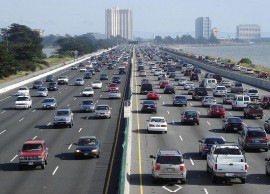
A happy day when the same interesting issue arises in two separate news stories.
First, over in America, President Obama is supposedly about to change the rules on the regulation of vehicle emissions. (Read about this here.) George W Bush’s policy was that states were not permitted to set standards tougher than those at federal level. This ensured that a car which met carbon dioxide rules in one state met them anywhere in the US. It therefore meant that individual states could not insist on higher standards than those of the federal government.
The new president, in a move that is being styled as a further break from the past, intends to decentralise the decision-making, allowing individual states to adopt stricter regulations if they wished. The consequence of this could be that California, where the voters are more in favour of environmental protection measures than they are elsewhere in the country, will adopt tougher standards, standards which in turn then spread nationwide by default because California is the largest state whose needs manufacturers will have to meet. Thus, standards in the US would be driven up because of the opinions of voters in one state only.
If your strategy is to introduce tougher environmental standards while outflanking public opposition and also declaring oneself in favour of states’ rights, this is a smart move. (This phenomenon has been remarked upon on this blog before: read about it here.)
The other example of the same issue comes from Wales, where a farmer risks prosecution for planting genetically-modified crops. (Read about this here.) His argument is that there is an EU-approved list of crops that may be planted and that lower levels of governments, such as that in Wales, may not introduce their own restricted versions of that list. His critics argue that there is a law which he has broken: the court may have to decide who is right.
There is always a tension in a federal system over the correct level at which each decision should be taken. The requirements of free movement tend to cause the correct level to drift upwards: one could imagine a situation where the Californian government adopted a particular set of emissions standards for reasons of economic protectionism rather than environmental protection. Tougher standards in one state might keep out products manufactured in another state. Differential standards like that could spell the end of the single market. (We can be fairly confident that this is not the motivation in California, given that it is not a major centre of the American car industry.) To prevent this would require regulation and decision-making at the federal level.
In the Welsh case, the prohibition, were there any, would go the other way round. The ban on the use of GM crops does not give home producers an advantage: if anything it would put them at a disadvantage. After all, the ban is not on the use of GM-derived material, but merely on the planting of the crops themselves. It seems to me that in this case member states and regions in the EU should be permitted to impose restrictions like this on their own citizens if they wish: to impose such restrictions on others is a different issue altogether and the single market principles of free movement (and thus federal decision-making) should then apply.
